One of the toughest tasks for you as an entrepreneur or a salesperson is to answer questions from prospective customers.
The ability to respond to these questions well is the difference between winning and losing in sales.
Some questions are more specific and related to your business.
Others are more general about a broad topic. For example, when a customer is asking your opinion about topics like work-life balance, wireless technology, and cybercrime.
Make sure you understand a question before answering it. Avoid any topic you know little or nothing about.
There are 3 simple questions every prospective customer will ask you:
- Why buy?
- Why you?
- Why now?
Your products or services won’t sell unless you answer questions.
Even companies on the Fortune 500 or Global 2000 lists still answer these 3 questions.
Being able to answer these questions effectively will enable you to build a multimillion-dollar company within a short period of time.
In this article, you’ll learn compelling ways to answer these 3 questions.
1. Why buy?
If you’re selling a product or service (someone else’s or your own), you should know why people buy your stuff.
Simply looking at your product and saying what it does is the wrong answer.
Know the primary reason why people buy.
For example, OmniKick is a tool that helps marketers’ collect email addresses on their websites.
But that’s not the primary reason people use our tool. Marketers use OmniKick because they want to develop deeper relationships with their prospects and make more money as a result.
Let’s look at the top primary reasons why people buy.
People buy to save money
People can do crazy things to save money.
A young couple lived in Google’s parking lot for 2 years to save 80% of their income.

A Tesla engineer saved $10,000 by living out of a van for 5 months.
Of course, most people don’t go to extreme lengths to save money.
Some people want to buy a home, car, and maybe get out of debt. Some companies want to reduce their annual expenses. So, they want to save money.
Sometimes, we spend to save money.
If your product or service helps a prospective client save money, he or she will be interested in buying.
People buy to make money
The alternative of more money is not having enough money. Or worse, it means being broke.
People want more money because it makes them feel secure. They want to have enough money to live on.
Most business owners will tell you that they want more money.
They want to have more money in their reserves so they can take more risks that help their business grow.
They want to increase sales and revenue. They want to employ more people to free up some time to pursue other goals.
People are always willing to buy your product and service if it means they’ll make more money than they are earning right now.
With my services, for example, I help businesses generate more sales and make more money through content marketing and search engine optimization.
People buy to save time
People are happy when they buy to save time, according to research published in the New York Times.
For example, an innovative product like PerSim from MedCognition helps first responders train faster using an augmented reality simulator.
Spending money to save time reduces stress. People are always willing to spend to save time as long as they can afford to do so.
For example, I became an Evernote Premium user because it helps me create, organize, and find my notes faster than other solutions out there. Evernote saves me time.
You buy faster computers to get more done in less time.
You buy smarter smartphones.
Your time is so valuable that you’re willing to spend money to save some of it.
So, if your product or service helps people save some precious time, that would be a good reason for them to buy it.
People buy to feel secure
One of the things that motivate people to buy is the need to feel secure.
They want to believe that what they have today will be there tomorrow.
For example, in the banking and finance industry, the need to feel secure is a critical motivator for acquiring and retaining customers.
Security is the feeling of certainty.
Everyone needs to feel secure in one way or another.
For example, computer users want to feel safe when they use their devices. They want to be sure that their personal information is secure online.
Tap into what makes potential clients feel secure, and they will be ready to buy your product.
People buy to gain knowledge
Knowledge is power.
With more knowledge, you’ll have more options, which then increase your power.
For example, Karen Brody, a relationship coach for men argues that men need her service to open any woman’s body, heat, and mind. She offers knowledge many men seek.
Knowledge is not limited to developing a new skill.
Sometimes, big companies like Google, Facebook, and Amazon acquire startups to gain vital information about web users.
Then, they use the information they get to improve their own products and services.
For example, Apple quietly bought Topsy, a Twitter, and general social media analytics service, for about $200 million.
Apple’s goal was to use Topsy’s data and social signals to bolster Siri and its App Store relevance.
If your product or service helps customers gain the knowledge they need, they will be willing to buy your product.
People buy to be healthy
Being healthy increases your productivity, helps you save money on life insurance, enhances your mood, and make you live longer. And a lot more.
People who are healthy look young. They also feel more attractive to the opposite sex.
When you tap into any of these reasons why people buy, prospects are more likely to want your products. For example, Drip IV Lounge published an article on their site titled “How an IV Drip Can Prevent Illness.” This article answers the question most of their prospects have.
Let’s move on to the next question potential customers ask.
2. Why you?
Why should prospects buy from you and not your competitors?
The first question tells them they need something you sell.
But they are others who sell the same or related products.
You need to give prospects a strong reason to buy from you and ignore your competitors’ offers.
How do you do that?
Build and protect your online reputation
What is the first thing you do before signing up for a company’s service?
You do an online search.
You ask your friends if they’ve used their services before.
What people see and say about your brand matters a lot.
A negative article that shows up in a top position on Google search results for your company’s name could mean you’re losing 50% in potential business.
When you build and protect your company’s online reputation, customers will trust you.
How do you build and protect your online reputation?
Conduct a simple search for your company’s name on Google.
Are the results saying positive things about your company?
And are you dominating the first page for your company’s name on Google?
For example, I entered “CA Technologies” into the search box on Google.
The brand dominates the whole of Google’s first-page search results for their name.
I could see links to the company’s US, UK, and Australia sites. And I could also see the brand’s social media profiles on Twitter, Facebook, LinkedIn, and YouTube.
The company’s Wikipedia and Glassdoor pages also rank on the first page.
By dominating the first page, the company can control what people see and read about their business.
Control what people read about your brand on Google and social media by becoming an active content creator and social media user. For example, On Your 6 Designs sells high-quality handmade Kydex holsters. The company dominates Google’s first page results for its name.
Set up a blog on your company’s site and pump out quality content on a regular basis. That will help you gain higher visibility on search engines.
Take your company’s name on top social media platforms like Facebook, Twitter, LinkedIn, Instagram, and others.
Make sure you’re active on these platforms. Engage in discussions and share valuable posts.
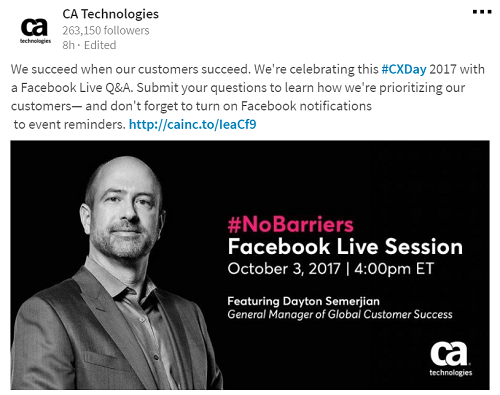
Ranking high on search engines for your company’s name and keywords related to your business, and being active on social media helps you control the narrative about your brand.
That is how you develop and safeguard your company’s reputation online, and this helps prospects choose you when they are ready to buy.
Earth Class Mail is a digital storage company based in the United. When you enter the company name into Google’s search box, you’ll see that they dominate the first page of Google results.
Make it easier for customers to do business with you
We live in a period of options.
If doing business with you is stressful, hard, or challenging, it’ll be easier for prospects to go to your competitors.
Making life harder for prospects isn’t going to make them want to choose you.
It should take less effort and time for customers to accomplish their goals with your business.
Your business should be well-staffed to deal with customers’ problems.
They should feel safe and secure doing business with you.
Customers should enjoy the easiness of doing business with you so much that they don’t want to try competitors.
Offer customers value they won’t get from competitors
Value is what customers get from your products or services.
Price is what they pay to get that value.
If you offer the same value as competitors, customers may want to purchase from the cheapest merchant or provider.
By increasing the value of your product, you’ll persuade customers to focus on the value they’ll get rather than the price they’ll pay.
For example, why do people buy Apple products even though they are expensive?
Apple offers more value than the competition.
Apple focuses on the quality and overall user-experience, and consumers love the design and aesthetics of both hardware and software of their products.
These are values you won’t get from Apple’s competitors.

Customers determine the value of your product by evaluating the price they pay and the benefits they get from buying.
Decide the value of your product before customers start doing that for you.
Amazon prides itself as “a place where people can come to find and discover anything they might want to buy online.” That’s value.
What’s the value customers can only get buying from you?
Your product could be affordable and offers the most value.
Or, your product could be expensive and still offers the most value.
It’s not easy to develop some unique value customers can’t get from competitors.
It takes time, serious deliberation, some inputs from the customers themselves, and a thorough understanding of the market to create extraordinary value.
Focus on addressing prospects’ most pressing concerns
Be proactive in dealing with potential customers’ questions and problems.
Don’t wait for prospects to come to you before you address a problem most of them have.
Research, discover, and address problems ahead of time.
How do you address prospects’ most pressing concerns?
By creating quality content that solves a problem for prospects.
When you do that, you impress potential clients.
They think of you when they finally need a product or service you sell.
Because you’ve impressed them by addressing most of their questions and problems, they’ll pay you back in forms of buying, referring customers, and saying good things about your brand on social media.
An article, video, an infographic, or a podcast that addresses a prospect’s most pressing concern is called custom content.
Eighty-two percent of consumers feel more positive about a company after reading custom content according to Demand Metric.
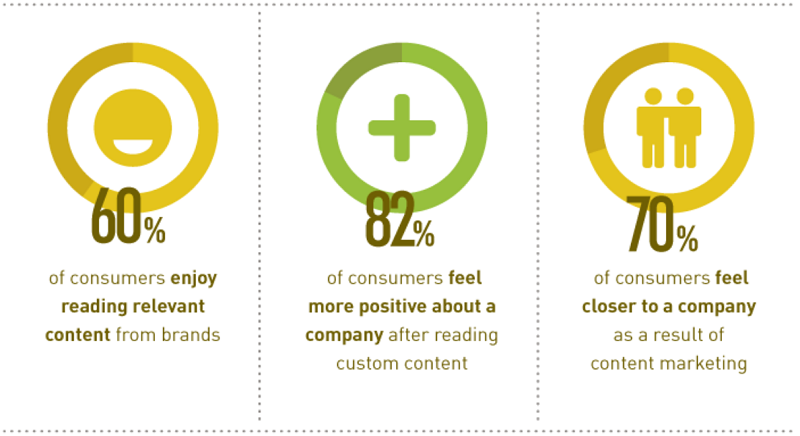
For example, SaaS companies like KissMetrics, Moz, Groove, CoSchedule, and Buffer acquire customers through publishing content that solves problems.
Below is a screenshot of an article that addresses a real problem for Groove’s prospects:
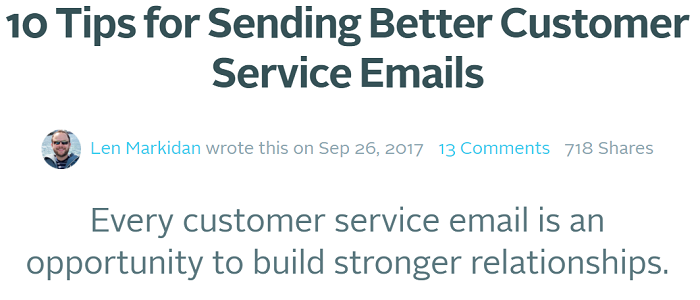
Publishing content like this makes customers choose your business when they are ready to buy.
Build a World-Class Customer Service Team
No matter what type of business you run, customer service is very important.
Customer service is another point of contact with prospects. You have to make it remarkable.
Sometimes, potential customers will have questions only a customer service representative can answer.
So, equip customer service reps with the tools and knowledge that will help them handle prospects perfectly.
If a prospect isn’t well handled, he or she could decide to buy from competitors.
A representative should exhibit patience, empathy, and consistency to prospects.
Some customers will be irate. Some will be full of questions. Others will be chatty. A rep should know how to handle all of them.
A prospect who is not well-handled is a lost advocate of your brand.
3. Why now?
Let’s assume that prospects now believe they need your product (why buy?). And you’ve given them strong reasons to ignore competitors and buy from you (why you?).
Now, prospects should know why they should buy now.
Why shouldn’t they postpone buying your product until next week, month or year?
They need to know why.
Buyers love to delay buying. It’s hard to make them part with their cash.
Promote limited-time offers
Prospects are more likely to act when they know there’s a time limit attached to an offer.
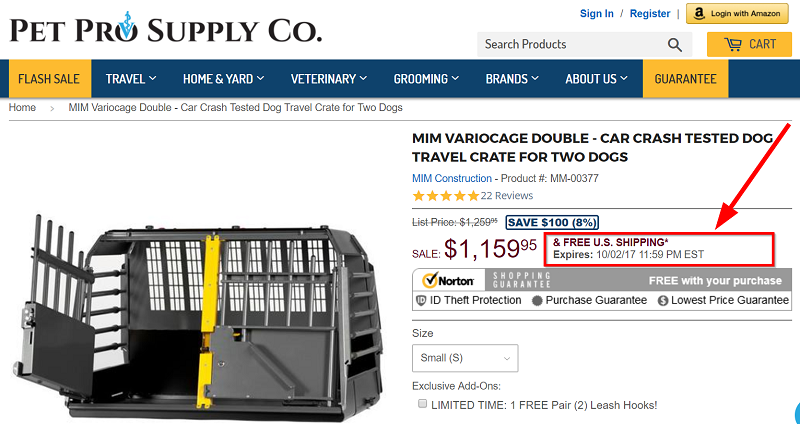
Many digital marketers ignore this strategy. It’s a technique any business can use.
It fueled the growth of Udemy, an online learning platform.
SiteGround, one of my favorite web hosting services also uses this marketing strategy.
SiteGround sent me an email asking me to refer a friend within 5 days and get up to 3 months of free hosting. The offer also puts me in a draw for the latest iPad Pro.
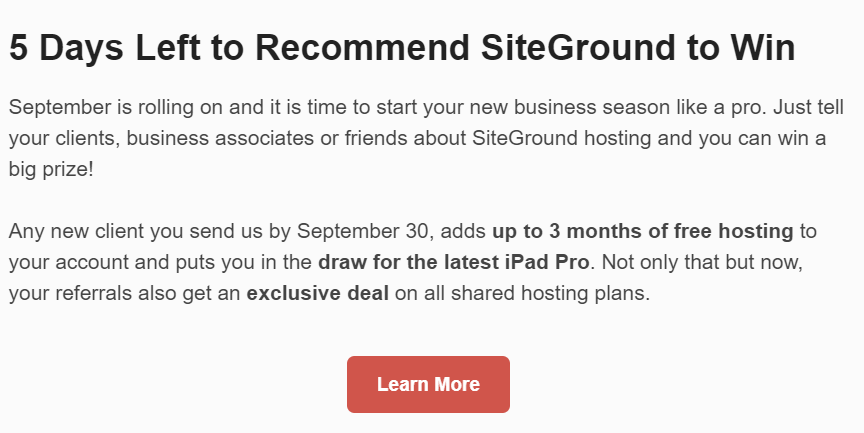
Offers like these make me want to act fast.
Note that you have to be honest when using this strategy.
Some websites show a sales offer to expire within an hour.
But when you revisit the site an hour later, you’ll find the same offer, similarly set to expire an hour later again. That’s deception.
Offer a money-back guarantee
If you’re running a software business, it costs you a few seconds of your time to refund a purchase. Though, some payment processors won’t return the processing fee.
This process could be a little bit more complex if you’re selling a physical product or service.
But it’s possible.
For example, Zappos, an online shoe and clothing shop based in Las Vegas, has a 365-day return policy.
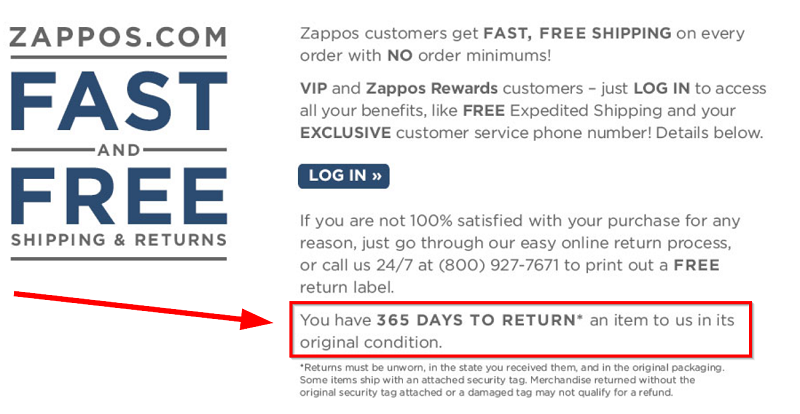
You won’t think twice about buying from Zappos because you can always have your money back if you’re not happy with the product.
When you offer a money-back guarantee, it gives customers a strong reason to buy immediately.
All their doubts about your product or service disappear.
Offering a money-back guarantee answers a customer when he/she asks, “why should I buy right now?”
By answering these 3 questions every prospect asks, you’ll increase the sales you generate online.
Remember, the questions are:
- Why buy?
- Why you?
- Why now?
What other questions do customers ask themselves before buying online?
Tell me in the comments.
